Tarsal Tunnel Syndrome
Medically reviewed by Drugs.com. Last updated on May 6, 2024.
What is tarsal tunnel syndrome (TTS)?
TTS is a condition that causes pain, numbness, and weakness in your toes or foot. The tarsal tunnel is between the bump on the inside of your ankle and ligaments stretched across your foot. Nerves, arteries, and tendons within the tunnel help your foot move and be flexible. TTS is caused by repeated pressure and swelling on the nerve that runs from your ankle to your foot.
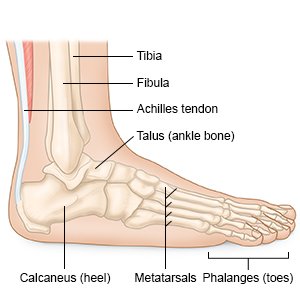 |
What increases my risk for TTS?
- Activities that use forceful or repetitive movement of your foot or ankle, such as dancing
- Tight shoes or sports gear
- A foot or ankle injury
- A mass that takes up space in your ankle, such as a ganglion cyst
- A bony overgrowth in your ankle
- Pregnancy, obesity, or varicose veins
- A health condition, such as diabetes, arthritis, or hypothyroidism
- Muscle differences or a foot that is not aligned correctly
What are the signs and symptoms of TTS?
Any of the following may be worse at night, or when you move or stand on your feet:
- Dull, sharp, or shooting pain in your foot or toes
- Numbness, tingling, or a burning feeling in your toes
- Weakness or swelling in your foot
- Loss of feeling in your foot or toes, foot cramps, or trouble moving your foot or toes
- An electric shock feeling around your ankle or on the bottom of your foot
How is TTS diagnosed?
Tell your healthcare provider about any foot or ankle injury or surgery you had. He or she may feel your ankle and foot. This will help him or her find swelling, bony growths, or other problems. Your provider may watch you stand or walk to see if you lean forward onto your toes. He or she may inflate a cuff on your leg, tap on your ankle, or bend your foot. Pain or other symptoms during any of these may help your provider diagnose TTS. You may also need any of the following:
- X-ray, ultrasound, MRI, or CT scan may show a trapped nerve, bony growth, ganglion cyst, or other problem. Do not enter the MRI room with anything metal. Metal can cause serious injury. Tell the provider if you have any metal in or on your body.
- Nerve tests may be used to confirm that TTS is causing your symptoms.
How is TTS treated?
Your symptoms may get better without treatment. You may need any of the following if your symptoms continue or are severe:
- Medicines:
- NSAIDs , such as ibuprofen, help decrease swelling, pain, and fever. This medicine is available with or without a doctor's order. NSAIDs can cause stomach bleeding or kidney problems in certain people. If you take blood thinner medicine, always ask your healthcare provider if NSAIDs are safe for you. Always read the medicine label and follow directions.
- A pain cream can be applied to your ankle and foot. The cream may contain an NSAID or other pain medicine.
- Nerve medicine may be applied as a cream or taken as a pill.
- A steroid injection may help decrease pain and swelling. Steroids are injected into the tarsal tunnel.
- Compression stockings may help lower swelling or treat varicose veins. Your healthcare provider can tell you which kind to get, and where to get them.
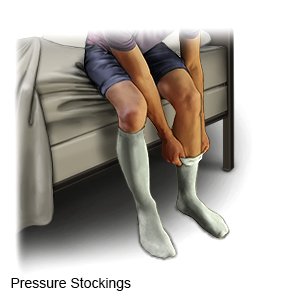
- Transcutaneous electric nerve stimulation (TENS) uses mild electrical impulses to help decrease your ankle and foot pain.
- Surgery called, tarsal tunnel release, may be used to take pressure off of the nerve in your ankle.
How can I manage TTS?
- Apply ice on your ankle. Apply ice for 15 to 20 minutes every hour or as directed. Use an ice pack, or put crushed ice in a plastic bag. Cover it with a towel before you apply it. Ice helps prevent tissue damage and decreases swelling and pain.
- Rest your feet. Let your ankles and feet rest for a short time between repetitive motions. If you feel pain, stop what you are doing and gently massage your ankle or foot. Your healthcare provider may recommend a controlled ankle movement (CAM) boot for a short time. A CAM boot will keep your ankle from moving.
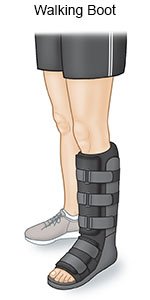
- Get physical and occupational therapy, if directed. Physical therapists will show you ways to exercise and strengthen your ankle. Occupational therapists will show you safe ways to use your ankle and feet while you do your usual activities.
- Use a splint as directed. A splint will support your ankle and decrease pressure on the nerve by letting your ankle and foot rest. You may need to wear the splint for up to 8 weeks. Your healthcare provider will tell you how long to wear it each day. He or she may want you to wear it all the time, or only at night.
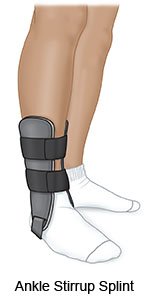
- Wear properly fitting shoes. Your shoes should have some space at the top, near your toes. Do not wear tight or pointed shoes. Do not wear shoes that have a high heel. Your healthcare provider may also recommend orthotics or padding to put into your shoes.
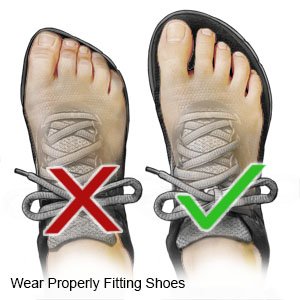
When should I seek immediate care?
- You suddenly lose feeling in your foot or toes.
- Your foot suddenly changes color.
When should I call my doctor?
- Your symptoms get worse.
- You have questions or concerns about your condition or care.
Care Agreement
You have the right to help plan your care. Learn about your health condition and how it may be treated. Discuss treatment options with your healthcare providers to decide what care you want to receive. You always have the right to refuse treatment. The above information is an educational aid only. It is not intended as medical advice for individual conditions or treatments. Talk to your doctor, nurse or pharmacist before following any medical regimen to see if it is safe and effective for you.© Copyright Merative 2024 Information is for End User's use only and may not be sold, redistributed or otherwise used for commercial purposes.
Further information
Always consult your healthcare provider to ensure the information displayed on this page applies to your personal circumstances.
